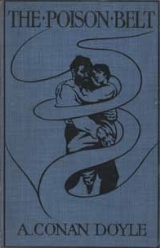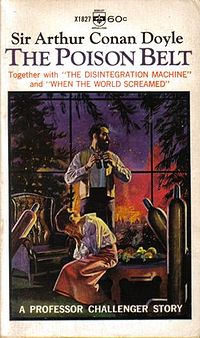
The Poison Belt
Encyclopedia
The Poison Belt was the second story, a novella, that Sir Arthur Conan Doyle
wrote about Professor Challenger
. Written in 1913, roughly a year before the outbreak of World War I
, much of it takes place—rather oddly, given that it follows The Lost World, a story set in the jungle—in a room in Challenger's house. This would be the last story written about Challenger until the 1920s, by which time Doyle's spiritualist beliefs had begun to influence his writing.
, which will, based on its effect on the people of Sumatra
earlier in the day, cause the end of humanity. Challenger seals them in the room with the cylinders of oxygen
, which he (correctly) believes will counter the effect of the ether. The sealing is not to keep the ether out - it permeates everything - but "to keep the oxygen in".
 The five of them wait out the Earth
The five of them wait out the Earth
's passage through the band as they watch the world outside die, and machines run amok. (In an interesting display of Victorian values - or, at least, Doyle's take on them - Challenger does not even consider including his servants; they are left outside the room to die, and continue to perform their duties until the ether overtakes them.) Finally, the last of their oxygen cylinders runs dry, and they open a window, ready to face death. To their surprise, they do not die, and they wander through the dead countryside in Challenger's car, eventually making it to London. They encounter only one survivor, who is an elderly, bed-ridden woman prescribed oxygen for her health.
After going to London and back, they make plans for the fate of the world at their hands—when suddenly, people start to wake up again. The effect of the ether turns out to be temporary, and the world wakes up again after a little over a day in a coma
, with no knowledge that they have lost any time at all. Eventually Challenger and his companions manage to convince the world what happened - a task made easier by the tremendous amount of death and destruction caused by runaway machines and fires that took place while the world was asleep - and humanity is shocked into placing a higher value on life, and how well we spend what little time we are given.
aired a radio drama version of the story in 1944, as a sequel to their well-received adaptation of The Lost World that spring.
An audio recording of "The Poison Belt" is available on the Internet Archive recorded by Mark F. Smith.http://www.archive.org/details/poison_belt_0812_librivox
Arthur Conan Doyle
Sir Arthur Ignatius Conan Doyle DL was a Scottish physician and writer, most noted for his stories about the detective Sherlock Holmes, generally considered a milestone in the field of crime fiction, and for the adventures of Professor Challenger...
wrote about Professor Challenger
Professor Challenger
George Edward Challenger, better known as Professor Challenger, is a fictional character in a series of science fiction stories by Sir Arthur Conan Doyle...
. Written in 1913, roughly a year before the outbreak of World War I
World War I
World War I , which was predominantly called the World War or the Great War from its occurrence until 1939, and the First World War or World War I thereafter, was a major war centred in Europe that began on 28 July 1914 and lasted until 11 November 1918...
, much of it takes place—rather oddly, given that it follows The Lost World, a story set in the jungle—in a room in Challenger's house. This would be the last story written about Challenger until the 1920s, by which time Doyle's spiritualist beliefs had begun to influence his writing.
Plot summary
Challenger sends telegrams asking his three companions from The Lost World - Edward Malone, Lord John Roxton, and Professor Summerlee - to join him at his home outside of London. The cryptic telegrams also instruct each of them to bring a tank of oxygen. When they arrive they are ushered into a sealed room, along with Challenger and his wife. In the course of his research, Challenger has predicted that the Earth is about to come into contact with a belt of poisonous etherAether theories
Aether theories in early modern physics proposed the existence of a medium, the aether , a space-filling substance or field, thought to be necessary as a transmission medium for the propagation of electromagnetic waves...
, which will, based on its effect on the people of Sumatra
Sumatra
Sumatra is an island in western Indonesia, westernmost of the Sunda Islands. It is the largest island entirely in Indonesia , and the sixth largest island in the world at 473,481 km2 with a population of 50,365,538...
earlier in the day, cause the end of humanity. Challenger seals them in the room with the cylinders of oxygen
Oxygen
Oxygen is the element with atomic number 8 and represented by the symbol O. Its name derives from the Greek roots ὀξύς and -γενής , because at the time of naming, it was mistakenly thought that all acids required oxygen in their composition...
, which he (correctly) believes will counter the effect of the ether. The sealing is not to keep the ether out - it permeates everything - but "to keep the oxygen in".

Earth
Earth is the third planet from the Sun, and the densest and fifth-largest of the eight planets in the Solar System. It is also the largest of the Solar System's four terrestrial planets...
's passage through the band as they watch the world outside die, and machines run amok. (In an interesting display of Victorian values - or, at least, Doyle's take on them - Challenger does not even consider including his servants; they are left outside the room to die, and continue to perform their duties until the ether overtakes them.) Finally, the last of their oxygen cylinders runs dry, and they open a window, ready to face death. To their surprise, they do not die, and they wander through the dead countryside in Challenger's car, eventually making it to London. They encounter only one survivor, who is an elderly, bed-ridden woman prescribed oxygen for her health.
After going to London and back, they make plans for the fate of the world at their hands—when suddenly, people start to wake up again. The effect of the ether turns out to be temporary, and the world wakes up again after a little over a day in a coma
Coma
In medicine, a coma is a state of unconsciousness, lasting more than 6 hours in which a person cannot be awakened, fails to respond normally to painful stimuli, light or sound, lacks a normal sleep-wake cycle and does not initiate voluntary actions. A person in a state of coma is described as...
, with no knowledge that they have lost any time at all. Eventually Challenger and his companions manage to convince the world what happened - a task made easier by the tremendous amount of death and destruction caused by runaway machines and fires that took place while the world was asleep - and humanity is shocked into placing a higher value on life, and how well we spend what little time we are given.
Dramatic adaptations
The BBCBBC
The British Broadcasting Corporation is a British public service broadcaster. Its headquarters is at Broadcasting House in the City of Westminster, London. It is the largest broadcaster in the world, with about 23,000 staff...
aired a radio drama version of the story in 1944, as a sequel to their well-received adaptation of The Lost World that spring.
An audio recording of "The Poison Belt" is available on the Internet Archive recorded by Mark F. Smith.http://www.archive.org/details/poison_belt_0812_librivox

